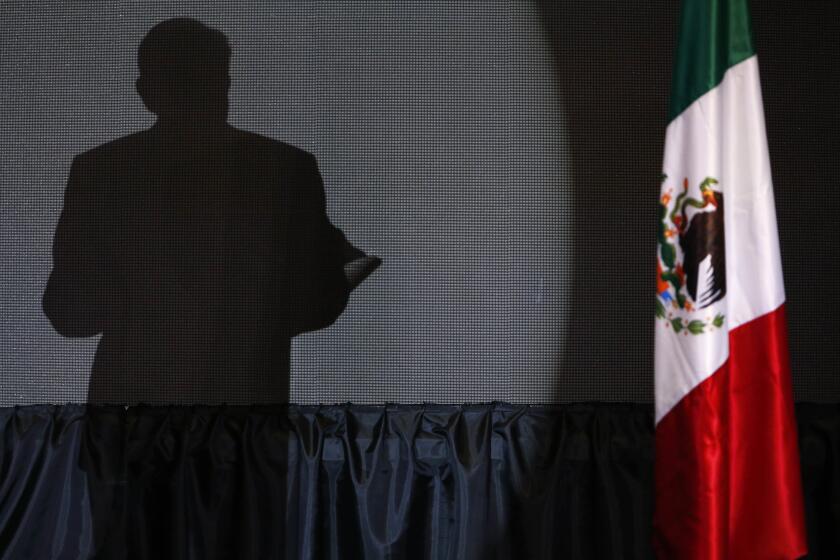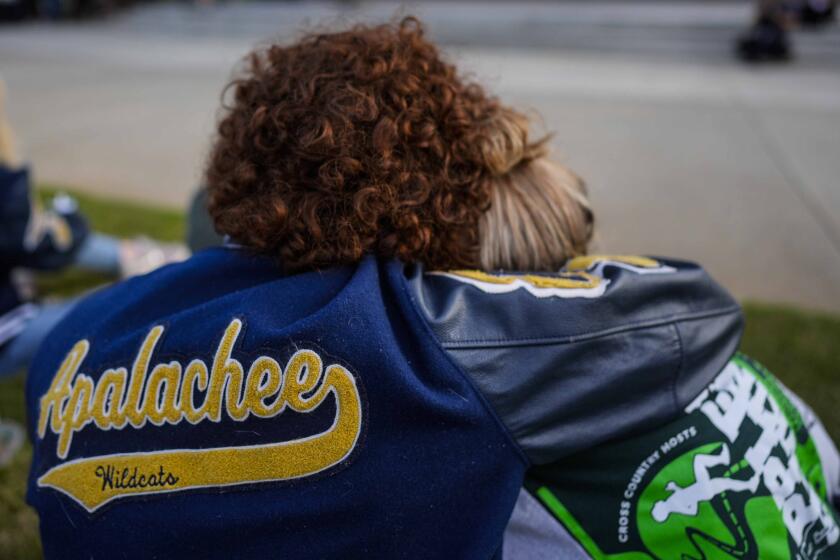Clerics Call for Restraint as More Violence Hits Iraq
Clerics on both sides of Iraq’s Sunni-Shiite divide scrambled Friday to calm believers on the Muslim holy day amid ongoing violence that claimed at least 25 more lives.
Eleven people were killed in a suicide bombing at a Shiite mosque in the northern Iraqi city of Tuz Khurmatu. Three laborers were gunned down while waiting for jobs in the capital, and a Shiite cleric was assassinated in Baghdad’s Sadr City neighborhood. The U.S. military said a Marine also had been killed Thursday in an explosion near Ramadi, west of Baghdad.
Sunni Arabs dominated Saddam Hussein’s government and security ranks, and a Sunni-driven insurgency has targeted U.S.-led forces, as well as Iraq’s interim government and the ascendant Shiite majority.
Abu Musab Zarqawi, a Jordanian-born militant who claims to lead the Al Qaeda terrorist network’s affiliate in Iraq, has taken responsibility for some of the worst violence. He declared war this week on Shiites in retaliation for an Iraqi-American offensive in the northern city of Tall Afar.
The declaration so shocked Iraqis that even the Muslim Scholars Assn., an organization of hard-line Sunni clerics alleged to have ties to the insurgency, demanded in a statement issued Friday that Zarqawi “retract these threats” because they hurt the Sunni Arab cause.
“It harms the image of jihad, obstructs the success of the resistance in Iraq and leads to more innocent Iraqi bloodshed,” the statement said.
Iraq’s Shiites have grown increasingly angry about violence directed at them. But in Najaf, Friday prayer leader Sadruddin Qubanchi of the Imam Ali shrine, one of the holiest sites in Shiite Islam, asked followers to turn the other cheek.
“Submitting to one’s passion and confusion will bring us to domestic sedition and eventually lead us to failure,” Qubanchi, a disciple of Grand Ayatollah Ali Sistani, told worshipers.
“We must go forward, be patient and carry on building the new Iraq.”
The suicide car bomb in Tuz Khurmatu, 150 miles north of Baghdad in an agricultural area populated by Kurds and Turkmens as well as Shiite and Sunni Arabs, exploded as worshipers began streaming out of the Rasul al Adham Mosque.
In addition to those killed, at least 20 people were injured.
Iraqi Army Capt. Hussein Mahmoud said later that authorities arrested a man near the mosque “from a neighboring country” who had an explosives belt strapped to his waist.
In the capital, Sheik Fadhil Lami, a preacher of the Ali Mosque in Sadr City, was gunned down as he drove his car to a gas station.
In Baghdad’s ethnically and religiously mixed Jadida neighborhood, witnesses and police said masked gunmen in three cars opened fire on a group of mostly Shiite day laborers, killing at least three and injuring 12. It was the second assault in less than a week on men waiting for jobs. At least 112 laborers were killed Wednesday in a car bomb attack in Baghdad.
“The driver was shouting, ‘God is great! Shoot them!’ ” said Ali Salaam Salman, a security guard who witnessed the Friday attack.
Iraqis who participate in the Shiite-dominated interim government are also targeted.
Gunmen on Thursday assassinated the mayor of the Sunni Arab city of Qaim in the western province of Al Anbar after barging into his home and killing four of his guards, a police official said Friday.
In Baghdad, a car bomb at a checkpoint killed three Iraqi police officers and gunmen killed two Transportation Ministry employees, police said.
Iraq’s sectarian divide zigzags across the social terrain.
Most of Iraq’s major tribes have both Sunni and Shiite branches. Iraq’s Kurds and Turkmen minorities also include Shiites and Sunnis. Despite basic doctrinal differences, Sunnis and Shiites often intermarry, and their children are raised in accordance with the father’s sect.
Iraqis dread the prospect of a civil war and often blame outsiders for stirring up tensions.
“We are living as brothers, Arabs and Kurds, Sunnis and Shiites and other religions,” Sunni Sheik Mahmoud Sumaidaie told worshipers Friday at Baghdad’s Umm Qura Mosque. “This country contained us for years. Why has it become too small to contain us now?”
Still, Sunnis and Shiites have starkly divergent views on fundamental political issues. Although most Sunnis abhor the draft constitution scheduled for a nationwide referendum next month, Shiites strongly support the document and the weak central government it would establish as a way of putting an end to Hussein’s era.
In addition, Shiites view recent U.S. and Iraqi military operations in Tall Afar and western Iraq as great successes against the insurgency, but some Sunnis call them acts of sectarian cleansing.
“We condemn the operations in Tall Afar,” Sumaidaie said in his sermon. “It is a sectarian war that targets a particular group. Violence will only produce violence. The country is in a dangerous situation.”
In western Iraq, U.S. forces discovered a 12-building complex near the Euphrates River town of Haditha that was used to assemble car bombs and other weapons, a statement said. Insurgents had fled the facility. U.S. forces hit the complex with airstrikes after it was discovered. No casualties were reported.
Times staff writers Suhail Ahmad, Saif Rasheed and Shamil Aziz and special correspondents Ali Windawi in Tuz Khurmatu and Saad Fakhrildeen in Najaf contributed to this report.
More to Read
Sign up for Essential California
The most important California stories and recommendations in your inbox every morning.
You may occasionally receive promotional content from the Los Angeles Times.










